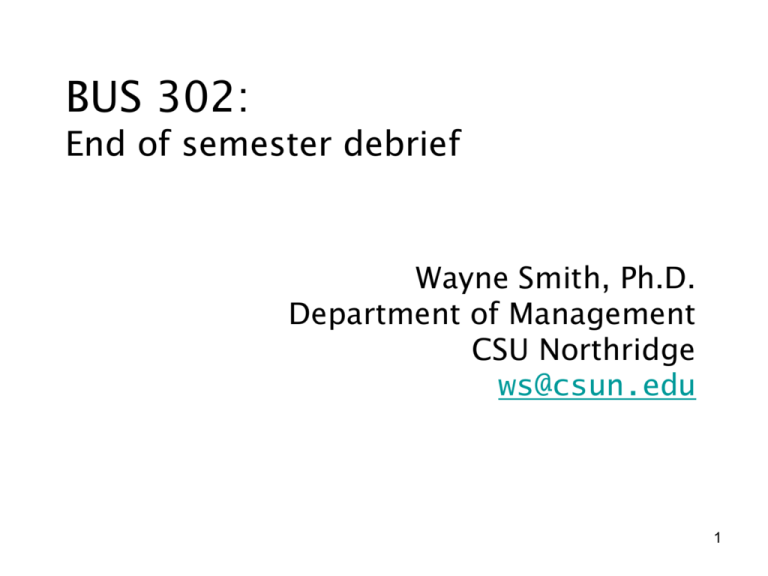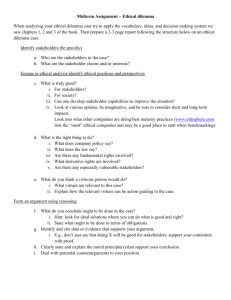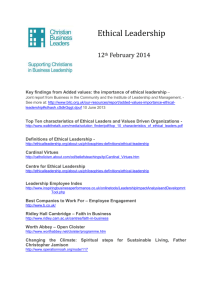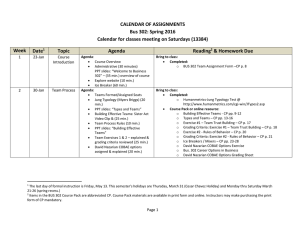ppt - Wayne Smith
advertisement

BUS 302: End of semester debrief Wayne Smith, Ph.D. Department of Management CSU Northridge ws@csun.edu 1 Use any Gateway Ideas (Content or Process)… • …In another class? • …At work? • …Elsewhere? • Explain. 2 Student Portfolio 3 What is a Professional? • • • • • • • • • • • Privileges preparation and readiness Is persistently ahead within any given project Sweats the details Embraces theory, eschews ideology Can hold opposing viewpoints and understands differing perspectives Espouses values, eschews ego-status Focuses well, take responsibility Learns rapidly in teams Takes (and gives) leadership role Gives (and receives) constructive feedback Can identify strengths of others, weaknesses in self 4 Progress and Development • “Matriculation” – “to enroll as a member of a body especially in a college or university” • “Accretion” – “the process of growth or enlargement by gradual buildup” • Source: Merriam-Webster Dictionary 5 Matriculation and Accretion More learning Integrate Subject Matter and Synthesize Processes Intrinsic Knowledge And Extrinsic Value Proposition Accretion Less learning Breadth of Foundational Skills Lower division Depth of Professional Skills Matriculation Upper division 6 Complementing “specialist” skills with “generalist” skills • COBAE graduates aren’t making pins in a pin factory – You’re managing the labor and capital associated with the pin factory • Gauging “strengths” and “weaknesses” rapidly requires – – – – some time diverse content and tasks timely, rigorous, relevant feedback deep preparation • It’s naïve to think that you’ll only (or mostly) work with individuals with same skills, knowledge, or abilities, much less with the same backgrounds and experiences • You really learn a topic when you have to teach it to someone else • The honest truth is that nobody (including you) knows what you’ll be doing in the half-life of your career, much less near the end of it 7 Student Portfolio 8 Post-BUS 302 Portfolio (the “hard” stuff) • Portfolio as a Professional • Beyond a Résumé – From learned capability to demonstrated ability – You tell the story of performance • http://www.csun.edu/it/portfolium • Evidence of Explicit Progress and Development – – – – – – LDC Interdisciplinary Thinking Introduction to Strategy Ethical Decision-Making Teams/Interpersonal skills Foundational Skills Oral and Written Communication 9 Post-BUS 302 Portfolio (the “soft” stuff) • Portfolio as a Student • Beyond a Grade – From learned capability to demonstrated ability – You tell the story of performance • Evidence of Implicit Progress and Development – Developed a sense for the level of peer competition – Learned the difference between effort and performance – Reflected upon your “fits” (strengths) and “gaps” (weaknesses) – Developed Active Listening skills – Learned how to provide Feedback and receive Feedback – Learned the attributes of a business professional 10 Key Differences between BUS 302 and other COBAE classes • From: Breadth of BUS 302 To: Depth of your Major – You’ll need to do everything in BUS 302 without being asked, including: • • • • • Excel at both quantitative tools and qualitative tools Effective oral presenter and strong written communicator Integrate topics and subject matter from multiple courses Strategic thinker Ethical decision-maker • From: Face-to-Face To: (occasionally) Hybrid or Online – Requires extreme self-discipline and focused attention • From: Small Class (N ~ 40) To: Large-lecture Hall (N ~ 160) – – – – You’ll need to stand out and distinguish yourself Learn to ask for feedback—early and often Leverage the Instructor’s Office Hours And more… 11 Brief Analysis of MGT 360 grade patterns… (yes, this needs some explanation…) 12 Prof. Wayne’s Top Ten Tips for Course Success: Avoiding “DUFs” • Empirically (that is, when one studies the issue in depth), how do students end up earning C-’s, D’s, F’s, and UW’s? • The “DUF” rate for small (40) sections is about 5% (i.e., 5% of 40 = 2) • However, the “DUF” rate for large (160) sections is about 15% (i.e., 15% of 160 = 24) • Or alternatively, holding everything else constant, quadrupling the class size triples the “DUF” rate • Lesson: Students need to focus and work harder in large lecture hall classes Prof. Wayne’s Top Ten Tips for Course Success: Avoiding “DUFs” • “UW/F” • • Issue: These students either don’t take the final, or more often, do little or no work after the mid-term, but don’t drop. This grade sticks with you unless and until you repeat the course (something you don’t want to do) and earn a higher grade ( something that can be hard to do) Remedy: Drop early. CSUN has student-initiated (and Universityinitiated) drops, but not instructor-initiated drops (like many CCCs). • “D+/D/D-” • • Issue: These students are missing much work throughout the class. Each missed assignment counts as a zero (i.e., an “F”) in your overall grade. Remedy: Always turn in all assignments even if you don’t feel it’s your best work. Don’t miss the mid-term or final exam. And of course, always attend every class. • “C-” • • Issue: These students earn C’s/D’s on most of their work, but moreover, the work doesn’t improve throughout the semester. That is, the level of performance at the end of class is very nearly identical to the level of performance at the beginning of class. Remedy: Strive to perform well early, but regardless, strive to continuously improve on each type of class work deliverable as best as you can. COBAE Upper-Division Core Courses (primary perspectives) External Orientation FIN 303 Financial Management MKT 304 Marketing Management Internal Orientation SOM 306 Operations Management MGT 360 Mgt. and Organizational Behavior Economic Capital Human Behavior 16 Ethical Considerations • Utilitarianism (“evaluated by the results”) – A Branch of Consequentialism – What is the greatest good for the greatest number? – Benefits divided by Costs → “Best Ethical Decision” • Deontology (“inherent duty”) – Categorical Imperative, Reciprocity – What is right, fair, and just for another individual? – Endowments subject to Burdens → “Best Ethical Decision” • Nicomachean (“moral virtues”) – Courage, Temperance, Liberality, Generosity, Magnamity, Immoderation, Gentleness, Friendliness, Wittiness, Truthfulness/Integrity, “Sense of Shame”, … – What descriptive attributes can be ascribed to me? – Good Virtues minus Bad Vices → “Best Ethical Decision” 17 Nicomachean Ethics • Nicomachean (“moral virtues”) – Courage, Temperance, Liberality, Generosity, Magnamity, Immoderation, Gentleness, Friendliness, Wittiness, Truthfulness/Integrity, “Sense of Shame”, … – What descriptive attributes can be ascribed to me? – Good Virtues minus Bad Vices → “Best Ethical Decision” • In addition to doing the right thing…you need to 1. 2. 3. 4. 5. • • • • Know it’s the right thing to do Know why it’s the right thing to do Do it in the way other ethical individuals would do it Always do that same thing in all future, similar situations Enjoy doing that thing And…do it with a compelling and persuasive argument And…take care to avoid making any logical fallacies And…link beliefs↔desires and intentionality↔understanding Whew!...But that’s what the business faculty require of 18 students and what employers require of professionals Extra-curricular activities matter…deeply • Join the student organization for your major – AA, BAY, AMA, LBA, SFA, BLA, MISA, etc. – http://www.csun.edu/cobaessc/clubs-andorganizations • Take a leadership role if you can 19 Key Leadership Skills from “Good to Great” What drives your economic engine? What are you deeply passionate about? What can you be the best in the world at? 20 Korn Ferry’s Four Dimensional Assessment • Traits – The natural tendencies and preferences you lean toward, including personality and intellectual capacity. • Drivers – The values and interests that influence your career path, motivation, and engagement. • Competencies – Your observable skills and behaviors that matter for success. • Experiences – The assignments and roles that shape you for future opportunities. 21 Fall in love… (yes, this needs some explanation…) 22 (hand back Ethics Essays) 23 (explain final grades and associated timelines) 24





